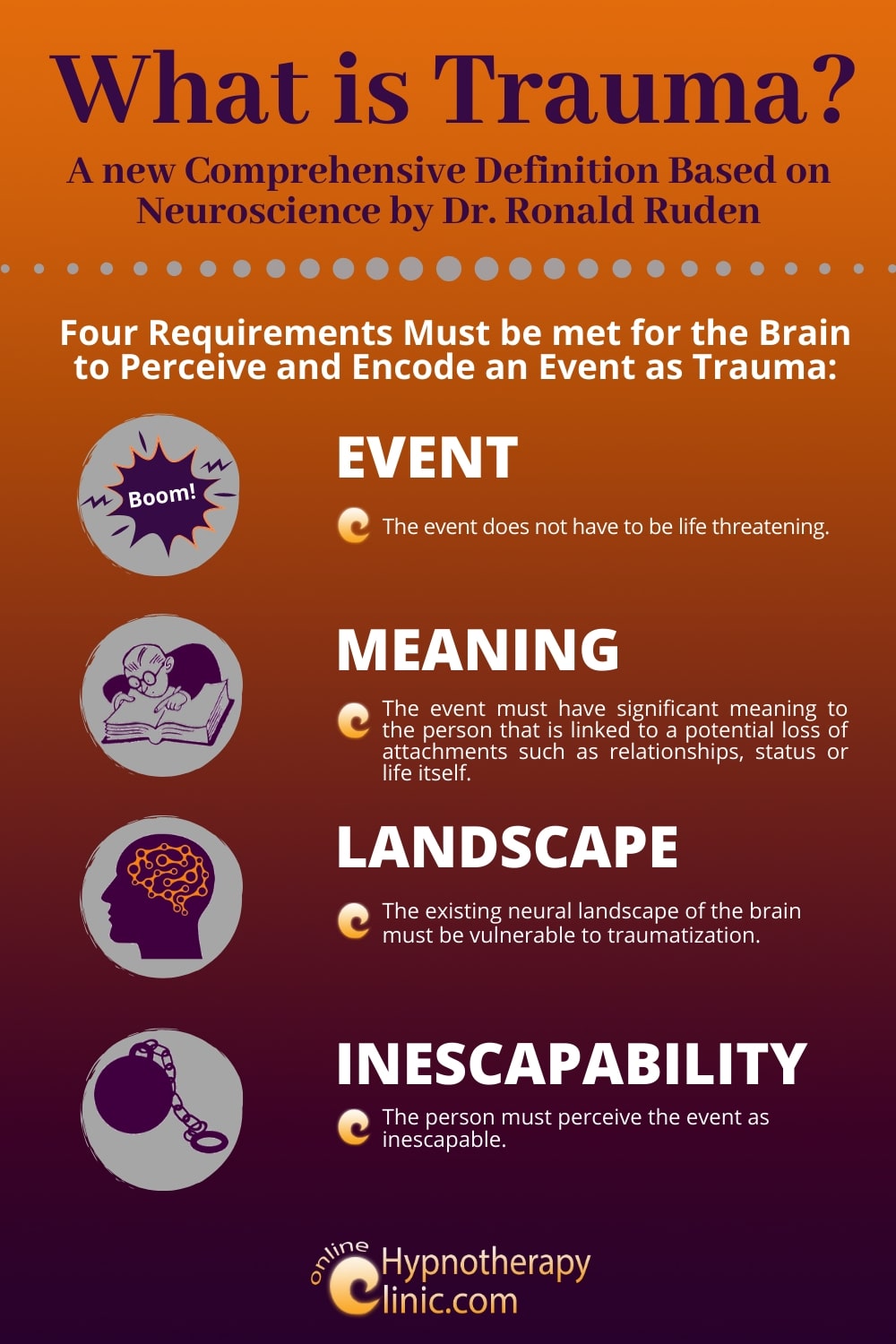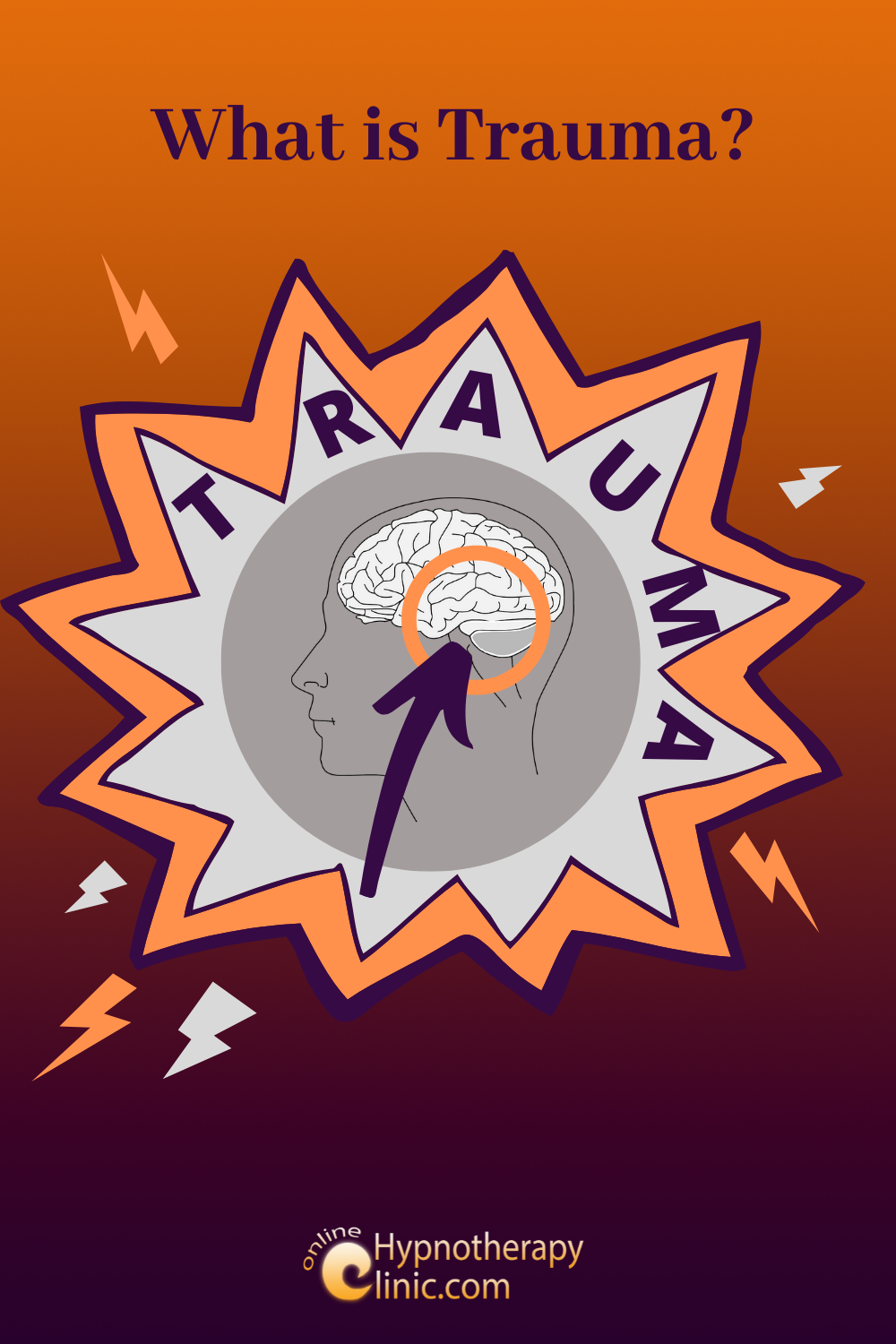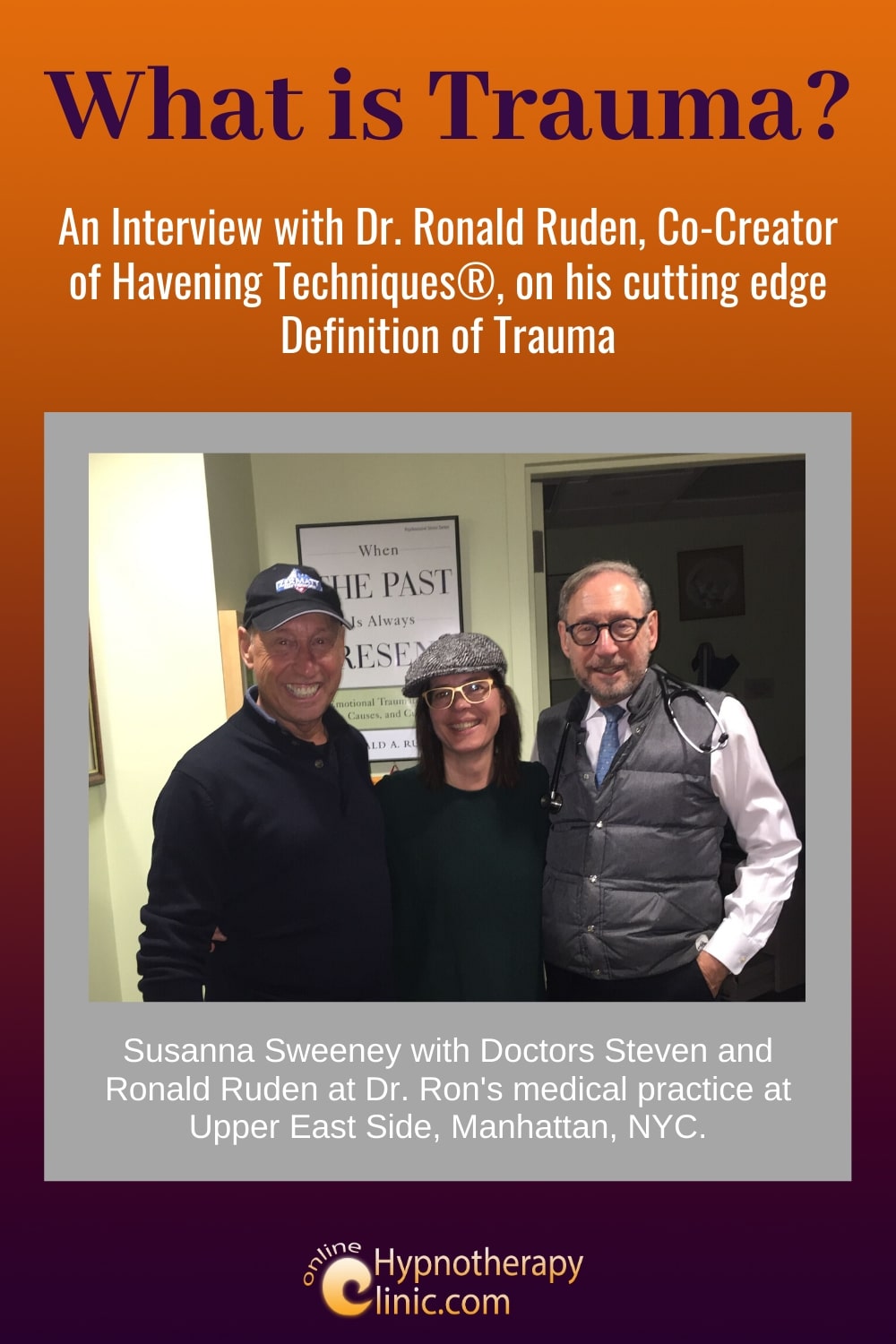What is Trauma?
By Susanna Sweeney, MSC, MBACP, CHT
What is trauma? The medical and psychotherapeutic communities have been working from the definition of post traumatic stress since the 1970ies. This definition leaves a number of observed phenomena unexplained:
- Why do some people develop post traumatic stress symptoms post trauma and others don't?
- Why do people develop the same type of PTS symptoms after life threatening events as others do after smaller, seemingly insignificant events?
- Why are memories of trauma so vivid, even decades later?
Furthermore, the prevailing definition of post traumatic stress considers PTS a 'syndrome' or a 'disorder'. This label evokes a sense of permanency or the idea for clients that they are somehow 'damaged goods' or there is something wrong with them once they develop these symptoms. That's why many clinicians nowadays, including myself, find this definition unhelpful.
Therefore, to answer the question "What is trauma?" in the most up-to-date way possible, I have interviewed Dr. Ronald Ruden, a medical doctor who has devoted many years of his life to studying the neuroscience of trauma., on his views on the issue.
The definition of trauma put forward in this article is based on neuroscientific findings of what happens in the brain at the moment of trauma.
Based on his findings, together with his brother Dr. Steven Ruden, Dr. Ronald Ruden has founded Havening Techniques®, a cutting edge modality for decoding traumatically encoded memory for the purpose of relieving and clearing the symptoms of trauma.
I asked Dr. Ronald Ruden: "What is trauma?"
What is Trauma?
Susanna Sweeney: Dr. Ruden, you are one of the most renowned experts in the trauma field, thank you for agreeing to this interview. Dr. Ruden, let's start with the basics. Let’s start by asking “What is trauma?” You have your own definition of what trauma is which is very comprehensive.
Dr. Ronald Ruden: Well, trauma by any definition is an injury either body or psyche. But I don't like those types of definitions because it doesn't give us much information, which could be trauma for one, let's say like a little paper cut, would be meaningless to another.
So what we have to understand is, what are the consequences of an event? And the consequence of a traumatic event is traumatization and traumatization is the encoding of an event which has meaning to the client in their memory in a very particular way- which then subsequently produces chronic, inescapable stress as it alters the brain.
So it's really not about the event itself. It's about the meaning of the event to the individual. It's about the vulnerability or the landscape of the brain at that moment and the perceived inescapability at that moment- considering those factors lead us to what is a traumatization response.
There are many examples of trauma and how traumatization occurs.
You can have it first person, second person or third person you could be
involved with it, or you could be a witness.
And so any one of these, depending on your existing neural landscape of the brain can induce a traumatization moment. And traumatization is a biological process. If you do not have a biological process, then the memory will not be encoded as a traumatic memory.
Susanna Sweeney: And so could I ask you to tsay more about the four elements that- in your definition of trauma- are required for traumatization just to illustrate to our audience what that actually means in practice?
Dr. Ron Ruden: Sure. I have a little acronym, EMLI which is E M, L, I, which stands for:
- The event
- The meaning
- The existing neural landscape
- And inescapability
All these four things are required before an individual’s brain will encode an event as a trauma.
More About Trauma
Here, Dr. Ruden presents a novel way of interpreting the well known symptoms of trauma, which directs clinicians as to what work they must undertake with their trauma clients so they can become symptom free once more.
Learn the exact sequence of electrical and neurochemical events that take place in the brain at the encoding moment of traumatization.
A new science of traumatic encoding of traumatic memories that finally gives answers as to how we can undo the often devastating effects of trauma.
Find out About Havening Techniques®
New York based brothers Dr. Ronald and Dr. Steven Ruden have used the knowledge gained in their intensive study of the neuroscience of trauma to find ways in which traumatic memory can be decoded so that people can change their lives by clearing any trauma symptoms they may have, including depression, anxiety, addictions, low esteem, chronic pain and many more. Their work culminated in the development of Havening Techniques®.
What is Havening and how could it Change your Life?
An introduction to the neuro science based healing modality of Havening Techniques. Find out how it could benefit you in changing your life.
Havening- Interviews with the Founding Fathers
Interviews with Doctors Ronald and Steven Ruden, the founders of Havening Techniques, on the origins of the healing modality, it's underlying tenets and its development.
Learn how you can use Havening Techniques at home for self help.
What is Trauma- continued
Event
Dr. Ronald Ruden: An event can be anything that happens to the person, it doesn't have to be life threatening. It doesn't have to be horrific beyond words. It can be a small little thing, like a pat on the back, or everyday stuff like divorce or a loss.
Meaning
Dr. Ronald Ruden: Trauma doesn't have to necessarily be a life threatening. All it does need to have is meaning for the individual. And that meaning is based on previous experiences and one's own, mindset which set the stage. That's why some people will have meaning for an event and then become traumatized and others will have no meaning for an event.
I keep on thinking about, you know, how many times in my career I've seen loss become traumatic for individuals. For example, I've seen traumatization from the loss of a pet and people really can't get over it. And I'm sitting there listening to the story of their loss. And although I am compassionate towards them, I am not being traumatized by that loss of that animal because the loss doesn’t have the same meaning to me as it does to the individual who had the loss.
Meaning in this context always has to do with a loss of attachments, or a threat of a loss of attachments, be they relationships, status, or potential loss of life, or another form of attachment.
Neural Landscape
Dr. Ronald Ruden: The next part of EMLI is the existing neural landscape. And that reflects in the concepts of resilience and vulnerability. Resilience can be a strong sense of self worth. It can be a sense of being able to solve problems.
And then- in contrast, there's vulnerability. Those people who have not had success in life, who have low self esteem, who have chronic issues of anger or grief or shame- these things can landscape the brain and make people more susceptible to traumatization or the encoding of the event as a traumatic memory.
Inescapability
Dr. Ronald Ruden: Finally, there's the inescapability of traumatization. As part of the event, you have to have a perceived moment of inescapability for it to be encoded as traumatic. You're in a car crash and the car is tumbling over. No escape. You're in a flood zone and you can't escape. You're in a a burning building and you can't escape.
In animal life one either escapes or one is dead when the predator comes along. If the predator catches you, in human life, you can experience life threatening things, but escape. Sometimes people escape from these things for a variety of reasons. But the mind perceiving inescapability is what is required for the event to be encoded as traumatic.
Susanna Sweeney: For me the concept of inescapability was the one element that really brought the definition of trauma together because it helped me to finally make sense of why big traumatic events and smaller, less significant events are encoded in the same way. The reason lying in the common element of inescapability.
Dr. Ronald Ruden: That's very true. And I have to make an editorial comment here. We look at trauma in the medical community under the definition of PTSD- post traumatic stress disorder.
I believe that diagnosis has held back the movement forward of understanding trauma tremendously because there are such cultural arguments. Is it that you're vulnerable, and that then it's really kind of your fault that you became traumatized or is it the event itself that is causing the symptoms? And the answer is, neither one is true by itself.
It is nature and nurture together. It is the event plus your perceived meaning of it and the underlying landscape of the brain plus inescapability which makes it traumatization.
And we can have many different events happen which for many people have no significant meaning, but for others have tremendous meaning. And we should never ever, ever think of any event that the person reacts to in a way that it produces a traumatization, as being insignificant.
New to Hypnosis?
These articles have been designed to help:
- What Is Hypnosis?
- How Hypnosis can Help you
- Does Hypnotherapy Work?
- How Does Hypnotherapy Work?
- I also recommend you bust any hypnosis myths you may have internalized before embarking on hypnotherapy.
I hope my interview with Dr. Ronald Ruden has helped to answer the question: What is trauma?
Feel free to let our community know in the comments underneath what you think about this new, cutting edge way of looking at trauma.
Regards,

Recent Articles
-
Havening Technique Training auf Deutsch
Feb 08, 24 11:02 AM
Havening Technique Training auf Deutsch- Details und Buchung -
Client Testimonials
Oct 06, 23 06:08 AM
Client Testimonials of my Online REPAIRenting® Program that uses various psychosensory approaches for safe and quick transformation -
Smoke Free Thanks to This Amazing Resource
Aug 02, 23 09:26 AM
Oh thank you for this simple resolution to all my worries! I feel like I have had a weight lifted off my shoulders. It is like cheating on giving up smoking.




New! Comments
What do you think? Leave a comment in the box below.